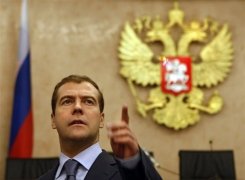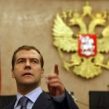
MEDVEDEV’S SOFT-SPOKEN HARD-LINE STATEMENTS
Publication: Eurasia Daily Monitor Volume: 5 Issue: 112
By:

Before taking office Russian President Dmitry Medvedev was presumed to be a “liberal,” who would somehow modify Vladimir Putin’s anti-Western rhetoric and authoritarian ways. Medvedev’s statements are indeed somewhat more polite, but Russian policy seems actually more hard-line. In Beijing last month, during his first trip abroad, Medvedev expressed clear-cut opposition to U.S. planned deployment of missile defense systems (MD) in Europe. Specific statements by the Defense and Foreign Ministries that followed the Beijing communiqué seemed to roll back the tentative compromises on MD achieved in talks in Moscow and Sochi last March and April (see EDM, May 29).
Last week in Berlin Medvedev called for a “pause” in NATO expansion, in MD deployment and recognition of Kosovo’s independence. Medvedev called for the creation of a new all-European security pact (see EDM, June 9, 10). In Berlin Medvedev announced, “Atlanticism has outlived itself.” In St. Petersburg Medvedev added that world financial problems were the result of American hegemony, while Deputy Prime Minister and Finance Minister Alexei Kudrin told journalists that NATO had to disappear in the waste bin of history (RIA-Novosti, Interfax, June 7). This week in Moscow, speaking at a conference of Russian journalists, Medvedev repeated his condemnation of NATO expansion and again called for the creation of a new all-European collective security organization. Medvedev confirmed that there were serious differences between Moscow and Washington on NATO expansion, MD deployment and the Conventional Forces in Europe treaty that Russia withdrew from last December. Still, Medvedev announced that Russia would work to find understanding with the United States on outstanding issues (RIA-Novosti, June 11).
Maybe Medvedev is still too weak politically to show his true political colors. Maybe Medvedev, Kudrin and other “liberals” are trying to placate anti-American, anti-Western hard-liners in the military and intelligence community. If Medvedev in his present weak position moves too rapidly to release political prisoners, including Yukos founder Mikhail Khodorkovsky, if he shows himself too soft in resisting U.S. hegemony and NATO expansion, he may be forced to resign or be declared ill. Under the Russian constitution, if Medvedev resigns or is somehow unfit to carry out his job, Putin, as prime minister, automatically becomes acting President and may be legally reelected president within three months.
Kremlin politics are always an enigma wrapped in mystery, but in practical terms it does not matter whether Medvedev is a weak “liberal” leader, who plays to the tune of hard-liners, or a true hard-liner in his own right. No one in the West seems to pay attention to Medvedev’s calls to halt NATO expansion, hand Kosovo back to Serbian sovereignty or build a new security organization that would overlap the OSCE and NATO, but these initiatives are not entirely harmless. Their rejection by the West may be used as an excuse for mischief.
In St. Petersburg Medvedev met with Ukrainian and Georgian Presidents Victor Yushchenko and Mikhail Saakashvili. Medvedev told both that their desire to join NATO threatened Russian national security. At the same time, the Kremlin expressed “cautious optimism” about a possible compromise after the Saakashvili meeting (RIA-Novosti, Interfax, June 7).
On May 31 without warning Moscow sent a battalion (over 400 men) of reportedly unarmed Railroad troops to repair railroad tracks in Abkhazia. Despite strong protests from Tbilisi and Western capitals and despite the reportedly “good” meeting between Medvedev and Saakashvili, the Railroad troops will continue their work in Abkhazia for at least two more months (RIA-Novosti, June 7).
In 1995 I was briefed by the Chief of General Staff Mikhail Kolesnikov about the strategic importance of the Russian railroads. The Russian military does not have any highway trailer platforms such as those regularly used in the West to move tanks and other heavy armor. Russian armor is moved in and out of battle only by railroad. That is why there are special Railroad Troops to keep the tracks in order during war and to organize makeshift armor battlefield disembarkment points. Russian highways are terrible, because during the Cold War they were seen as possible routes for motorized Western armies to invade. There still is no highway connecting Moscow with the Pacific coast, but the railroads are fine and connect all strategic destinations. Because of railroad platform weight constraints, Russian tanks weigh less than 50 tons, their armor thinner than that of modern Western ones.
In a war situation in Abkhazia, Russian tank columns would destroy the only coastal highway leading south from the Russian border. The prior deployment of Railroad troops and repairs of the tracks are an essential part of preparation for serious armed action in Abkhazia. In two or three months when their job is done and all is ready for action, it will be the end of August. By then, the summer vacation season that brings masses of Russian seaside tourists and revenue to Abkhazia will be over. By then the mystery about “who is Medvedev” may be resolved.




